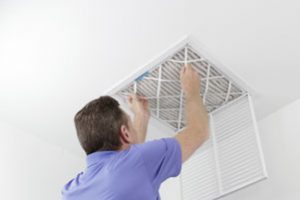How Much Does HVAC Maintenance Cost?
Posted on May 19th, 2019 by carrolladmin

Having a properly operating HVAC system drastically improves the quality of your life and that of your family.
The key to extending the life of your HVAC system is completing regular maintenance.
Keep reading to learn about recommended maintenance options, HVAC maintenance costs and what general schedule you should follow.
Monthly HVAC Maintenance Cost Estimates
Here are a few recommendations for HVAC maintenance to perform on a monthly basis.
Check your filter
While your filter doesn’t have to be changed each month, you should check it to ensure it isn’t dark or clogged. Once your filter gets dark, it’s time to change it because it is no longer filtering air properly. This can cause your HVAC system to run harder than necessary.
If you have pets, you should change your filter every month because they bring more dirt, dander, fur, and hair to your home causing the filter to clog up faster.
Remove debris
Your air conditioning and heating units will not operate at an optimal level if they are covered with debris including leaves, pollen, grass, sticks, etc.
Be sure to keep the area around your units clear and ensure there’s nothing stuck to or inside of them. You should also keep 2 feet of space clear around your outdoor units.
Check electrical connections
The safety and efficiency of your unit can be reduced if the electrical connection is not strong. You want to check that there aren’t any loose, broken, or disconnected cords.
If it isn’t a simple fix such as plugging the cord back in, contact a professional HVAC technician.
Quarterly HVAC Maintenance Cost Estimates
Here are some suggestions for HVAC maintenance to perform on a quarterly basis.
Change your filter
If your filter isn’t dirty during your monthly checks, you need to change them every quarter, or every 3 months. This ensures that they continue to filter the air throughout your home and your HVAC system properly.
You can also improve the operation of your system by purchasing high-quality, high-efficiency filters that keep even the tiniest particles from getting through.
Set appropriate temperatures
The minimum and maximum temperatures you use will vary dependent on the season.
In the winter, your unit should be set no lower than 55 degrees. In the spring and summer, the temperature shouldn’t be set higher than the temperature outside or what would be considered a comfortable room temperature.
Get your system serviced
Having your system serviced by a professional can help to ensure there are no problems that you’re unaware of. Your heating system should be checked in the fall, and your AC unit should be checked in the spring.
Yearly HVAC Maintenance Cost Estimates
Here are several tips for yearly HVAC maintenance.
Level your unit
It’s important to ensure your unit is leveled every year. The ground can shift over time, and if your unit is operating from an angle, it reduces the effectiveness of the machine.
Depending on your skill level, you might be able to level the ground yourself, or you might prefer to hire a professional to do so for you.
Clear AC condensate drain
To keep your AC condensate drain clear, pour a mixture of water and bleach down the drain once per year.
Cover your AC Unit
In the winter, you should cover your AC unit with a piece of plywood or an air conditioner cover.
Doing so prevents damage from taking place during the winter months that will require AC repair.
Performing HVAC Maintenance Tasks
You can complete most of the HVAC maintenance tasks above.
When you get your AC and heating units serviced by a professional, they perform more comprehensive preventative and diagnostic maintenance.
Here is a list of what you should expect a professional HVAC technician to do during your annual AC and heating unit maintenance visits.
AC Unit Maintenance
- Replace filters
- Check the condition of belts and pulleys
- Clean condenser and evaporator coils
- Check refrigerant charge and inspect for leaks
- Clear drain lines and pans
- Check electrical connections
- Check fan and blower motor operation
- Lubricate motors, bearings, and other moving parts
- Check operation of thermostats
- Check for adequate air flow
Heating System Maintenance
- Replace filters on heating equipment
- Check the condition of belts and pulleys
- Clear drain lines and pans
- Check electrical connections
- Check operation of fan and blower motor
- Inspect ignition and burner assembly
- Lubricate motors, bearings and other moving parts
- Check operation of thermostats
- Inspect heat exchanger
To maintain the proper operation of your HVAC system, you want to put your systems on a regular maintenance schedule. There’s maintenance you can do yourself, but it’s essential to have an expert look at your systems each year.






